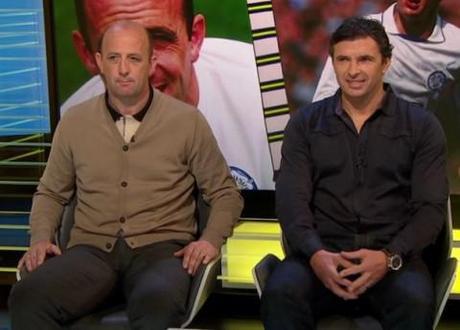
Gary Speed (r) appearing alongside Gary McAllister (l) on BBC Football Focus on 26 November 2011
The death of Gary Speed, Wales manager and one of the shining stars of the early Premier League years, has shocked and saddened the world of football. There were heart-wrenching one-minutes silences before both Premier League games on Sunday and tributes from friends in the game from Ryan Giggs to Robbie Savage have flooded in.
Speed appeared on BBC’s Football Focus TV show on Saturday morning and there was “nothing obviously wrong” noted The Times. Hours later, Speed committed suicide in the garage of his £2 million Cheshire home. He was discovered by his wife, Louise, just after 07.00 on Sunday. Friends who had spoken to him recently said he had shown no signs of unhappiness and they had no idea what might have caused him to take his life.
“Spoke to him yesterday morning. Why! Why. Why!! He was upbeat on phone yesterday we were laughing together, talking football and dancing he was a great team-mate and a great friend”, tweeted Robbie Savage who is currently appearing on ITV’s Strictly Come Dancing and played alongside Speed for Wales. He later added: “I’ve got very close to Gary in the last few years — the guy is a trooper, he’s left two gorgeous kids behind and a beautiful wife. He had everything.”
Speed’s reported suicide at just 42 has come completely out of leftfield because, to associates, and and even friends, he seemed to have so much to be positive about in his life. As manager of Wales he had overseen a dramatic upturn in the country’s fortunes; he had two young sons (13 and 14) who are both making great sides as sportsmen; and was happily married.
“I’m totally devastated. Gary Speed was one of the nicest men in football and someone I am honoured to call a team-mate and friend. Words cannot begin to describe how sad I feel at hearing this awful news”, said Manchester United’s Ryan Giggs in a statement.
Speed played a whopping 535 matches in the Premier League, still the third-highest of any player. He played for a string of top clubs including Everton (the team he supported), Leeds United, Newcastle United and Bolton Wanderers. As a player, he was blessed with a sweet left foot and highly regarded throughout the game for his ability to both play elegantly but also mix it when required.
Nice guy in an increasingly cynical sport. “As a man, Speed had many qualities”, said Henry Winter of The Daily Telegraph. “Even after long reflection, it is hard to think of many more popular individuals in his chosen industry. He was just a nice guy in a sport that can turn people cynical. Incredibly generous with his time, Speed would engage any fan wanting an autograph or photograph. He would always look people in the eye, always treat them well. There was none of that superstar dashing to the supercar arrogance.” Winter insisted that Speed’s legacy is the current Wales team who have taken great strides up the FIFA rankings and won four of their past five games.
Proud Welshman. “Whatever personal demons drove him to end his life, the man I met 10 months ago seemed witty, charming and self-possessed”, insisted Brian Viner in The Independent, who said Speed’s death is “unspeakably sad news.” “He was as passionate a Welshman as Max Boyce, and admitted to me that in his playing days he would make sure that every time he crossed the border from England, Tom Jones was on the car stereo system singing ‘Green, Green Grass of Home’”, noted Viner.
Anyone’s public face is the tip of the iceberg. Richard Williams of The Guardian described Speed as a “football man of principle who engendered huge affection.” Williams insisted that “any speculation on the cause of Speed’s death on Sunday morning seemed intrusive … Here, it seemed, was proof absolute that anyone’s public face, no matter how famous or how obscure, is merely the tip of their real life. The rest of the iceberg remains unknown to the outside world.” Williams suggested that the “unspoken thought was this: it can’t have been about football.”

